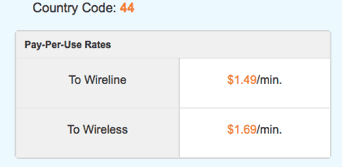Does Title II Regulation Inevitably Lead to Price Regulation?
Let us give two cases where services clearly subject to Title II regulation have had so much forbearance that prices rose to levels that clearly were not in the public interest. In both cases FCC, at the urging of corporate interests no doubt, continue to forebear year after year, even decade after decade.
Case I: Prison telephone rates
We see headlines on the FCC site like “FCC Continues Push to Rein in High Cost of Inmate Calling”. But dig a little deeper into the document linked to this headline and you see it starts with
“In 2013, nearly ten years after Martha Wright, a grandmother from Washington, D.C., petitioned the Federal Communications Commission (Commission or FCC) for relief from exorbitant long-distance calling rates from correctional facilities, the Commission took long overdue steps to provide relief to the millions of Americans paying unjust and unreasonable interstate inmate phone rates. These exorbitantly high rates discouraged phone calls and, at times, made it nearly impossible for inmates to maintain contact with their families, friends and communities, to society’s detriment.”
As a historical note, Ms. Wright’s grandson was actually released from prison before FCC acted on her petition! (Perhaps it is surprising that FCC did not use this as an excuse to dismiss the petition as moot.)
When FCC deregulated Operator Service Provider (OSP) prices in the 1980s because “competition was adequate” it continued to turn a blind eye to OSP pricing abuses for decades. While it should be clear that prison inmates are the original “captive audience” for carriers, it was not so clear to the leadership of the former Common Carrier Bureau and the present Wireline Competition Bureau who turned a blind eye to the problem year after year, decade after decade, under chairmen from both parties. No doubt pressure from corporate lobbyists seeking to maintain their high income streams did not hurt. Your blogger did some work for one of the carriers in this business (dealing only with cellular jamming policy within prisons) and it is the only client he ever had that he felt uncomfortable with due to the details of the business model that came up in discussions.
But FCC was perfectly able to forebear from regulation in this area even though net neutrality policy wonks think regulation is inevitable under Title II.
Case II: International telephone rates from cell phones and wireline carriers
OK, you may say that in the prison case they finally did regulate so it is inevitable. Here is an example where FCC forbearance continues despite not being in the public interest. Ever try to make an international call from your cellphone or landline? Consider this provision of § 201(b)
“All charges, practices, classifications, and regulations for and in connection with such communication service, shall be just and reasonable, and any such charge, practice, classification, or regulation that is unjust or unreasonable is declared to be unlawful”
Here are AT&T’s present rates for a call from a landline phone:

(Clicker here to AT&T’s high rates to other countries)
While these rates are less than the AT&T rates from the 1970s, about $3/minute, they are not significantly less and certainly do not reflect the economies of today’s telecom technology. Why are these prices so high? (Trust me, the other cellular and wireless carriers are all about the same.) Forbearance! Public interest be damned, be nice to lobbyists and vested interests forbearance! Works at FCC under both parties.



![Validate my RSS feed [Valid RSS]](valid-rss-rogers.png)

